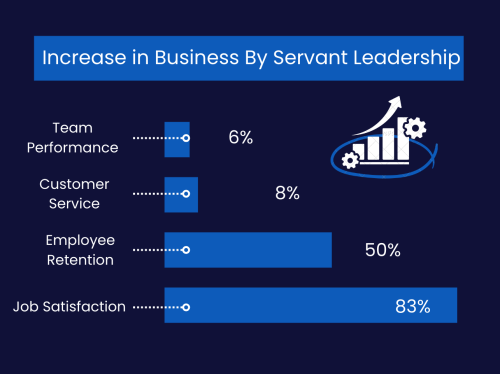The Impact of Servant Leadership in the Workplace People all over the globe talk about leadership. C-suite-level executives want to learn how they can better inspire others to lead, as well as how they themselves can lead better....
By Matt Rowe
This story originally appeared on Calendar
People all over the globe talk about leadership. C-suite-level executives want to learn how they can better inspire others to lead, as well as how they themselves can lead better. While there have been many studies on various types of leadership, one that stands out is servant leadership.
What is Servant Leadership?
Servant leadership is where the leader views themselves as someone who serves and builds up the employees they are over. A servant leader attempts to find ways to give employees tools to solve problems and does their best to help employees grow and learn. Generally speaking, servant leadership helps employees feel valued, seen, and essential to the company. Later in this article, we will dive into specific studies on this. Still, if you were to have one takeaway on servant leadership, it's that servant leadership prioritizes employees and their individual growth.
Impact of Servant Leadership
A recent study by UKG found that managers and leaders have just as much impact on people's mental health as their spouses (69% each), even more than their doctor (51%) or therapist (41%). Mental health is becoming more and more of a concern and priority for companies around the globe. Consequently, managers are given a portion of this responsibility and must support and build up employees while pursuing company goals.

The Power of Servant Leadership
One excellent approach to achieve this is through servant leadership, in which managers prioritize "their key role as serving employees…. providing tangible and emotional support." When appropriately implemented, servant leadership offers numerous benefits that can positively impact organizations, such as improved employee engagement, trust, and team performance.
An international study revealed a significant positive correlation between servant leadership and various key factors such as team performance, organizational citizenship behaviors, creativity, and individual voice. Moreover, another study indicated that servant leadership enhances employee engagement by fostering increased trust between employees and their managers. While trust may not seem like much, Harvard Business Review found that when employees feel trusted by their managers, they perform at a higher level, put in extra effort, and go above and beyond.
Engagement is also extremely powerful, as engaged employees experience higher happiness levels, increased effectiveness, reduced stress, and a lower likelihood of burnout. These benefits are essential for any organization, as happier and less stressed employees will likely stay with companies longer and be more satisfied with their work. Lastly, with more satisfied and higher-performing employees, customers will also be more satisfied and loyal to the company.
Translation into the workplace
Additionally, these advantages translate into enhanced team performance and ultimately contribute to the company's overall success. Servant leadership proves to have more tangible benefits as well, such as 6% higher performance, 8% better customer service, and 50% better employee retention. Servant leadership is so essential that PricewaterhouseCoopers recommended servant leadership to a small company in a consulting project. This resulted in greater trust between managers and employees and more significant employee innovation.

Servant leadership is compelling because it connects managers to their team members much better than other leadership styles. Business Leadership Today said, "More than any other leadership style, servant leadership provides the best approach to managing culture and managing people." Servant leadership is great at managing people because it shows team members they are important, valued, and seen in the workplace.
Implementation
Simply put, servant leadership helps teams perform better and leads to increased job satisfaction, but how can it best be implemented? One place to start is to have leaders ask employees, "How can I help you be successful?" Asking questions like this can help employees and managers get on the same page about how to accomplish work best, and managers can better give employees the tools and resources they need to be successful.
However, setting concrete boundaries is vital to ensure managers avoid burnout and get their work done. Managers are already stretched so thin, and asking them to provide a completely new leadership style would undoubtedly be difficult for many managers. While setting boundaries will vary from team to team, managers mustn't burn out themselves and take the time they need to complete their work and find fulfillment.
Characteristics of Great Servant Leaders
Gonzaga University found that certain qualities help servant leaders become more effective in the workplace. Some of these qualities are listening, empathy, and building community.
Listening
Listening is an excellent characteristic of any leader, especially a servant leader. Robert Greenleaf, the principal founder of servant leadership, said that authentic listening "builds strength in other people that leads to more effective interpersonal communication." Better interpersonal communication helps avoid potential problems in the workplace and ensures that everyone is always on the same page.
Empathy
Gonzaga states, "Empathy is an awareness of, and sympathy to, the thoughts and feelings of others [and] is essential to receptive listening skills of the servant leader." While empathy is a part of other types of leadership, servant leaders are known always to be empathetic. It plays a vital role in this type of leadership as when leaders are empathetic, they can better serve and build up their employees.
Building Community
Building a community that can contribute significantly is potent for the workplace. Servant leaders, obviously, focus on employees as individuals, and in doing so, they can change the environment at work and build a safe and productive community. Servant leaders can focus on individuals and help them contribute to the great community.
Summary
Servant leadership increases team performance, customer service, and employee retention. As employees feel valued and respected, they naturally perform better and trust the leader more. When implementing servant leadership, managers must ask questions about employees and set healthy boundaries to ensure they do not burn out. However, servant leadership can change people, teams, organizations, and society. If modern-day businesses want to improve their organizations, a great solution is to implement servant leadership.
Image Credit: Pexels; RDNE Stock Project
The post The Impact of Servant Leadership in the Workplace appeared first on Calendar.









